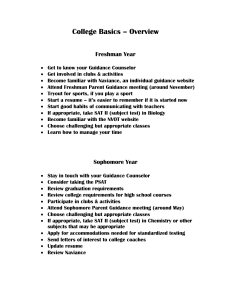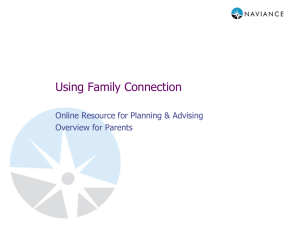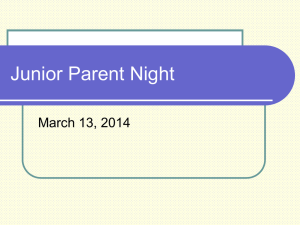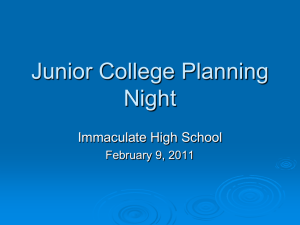ELHS Senior Parent Night - East Lyme Public Schools
advertisement
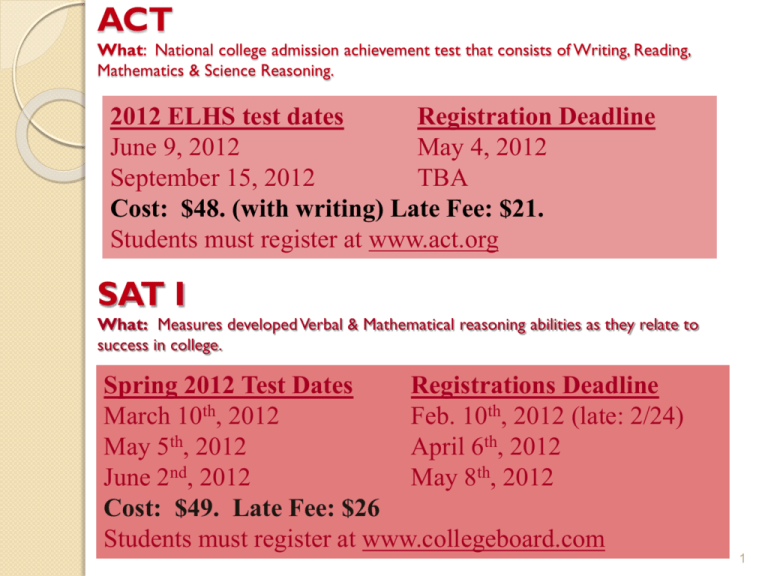
ACT What: National college admission achievement test that consists of Writing, Reading, Mathematics & Science Reasoning. 2012 ELHS test dates Registration Deadline June 9, 2012 May 4, 2012 September 15, 2012 TBA Cost: $48. (with writing) Late Fee: $21. Students must register at www.act.org SAT I What: Measures developed Verbal & Mathematical reasoning abilities as they relate to success in college. Spring 2012 Test Dates Registrations Deadline March 10th, 2012 Feb. 10th, 2012 (late: 2/24) May 5th, 2012 April 6th, 2012 June 2nd, 2012 May 8th, 2012 Cost: $49. Late Fee: $26 Students must register at www.collegeboard.com 1 Junior College & Career Night: College Admissions Info Careers and Majors The College Visit Preparing to Apply Standardized Tests Naviance Counselors: Michelle Dean, Allison Kosswig, Nadine Barnes Visit: www.eastlymeschools.org connection.naviance.com/eastlymehs 2 Most popular colleges attended by the class of 2011 Three Rivers 40 UCONN 32 University of Rhode Island 7 University of Vermont 7 UMASS Amherst 5 Lincoln Tech 5 Avery Point 16 Eastern CT 7 Northeastern 6 Southern, Central, & Western CT 6 Mitchell College 5 Fairfield University, Gettysburg College & University of New England 3 Approx 36% of graduates are attending CT State institutions 3 What information are the colleges asking for? • Strength in Subjects (4-5 Core Courses/Year) • Grade Point Average (GPA)/ Rank in class • SAT I /SAT II/ACT Scores • Admissions Essay/Interview • Recommendations The Application • Caliber of H.S. 4 More Competitive Colleges What makes student stand-out? Is the student well-rounded? Leadership Qualities Character: #1 Non-academic Quality Did student “take advantage of what the H.S. has to offer?” APs, Honors, Leadership opp’s.etc. What can student bring to them (Athletics, Music/Art Talents) Remember: Selecting a Class rather than Just an Individual. 5 Exploring Careers & Majors •While some students know exactly what they will choose as a major, most do not. •Those who aren’t sure about their plans should research possible majors by completing the Personality Inventory or Career Interest Inventory on Naviance •Read about careers & majors at mymajors.com, collegeboard.com and princetonreview.com •Relax – many students apply “undeclared” and most students change their major at least once in four years of college. 6 Generating a List of Colleges Using Naviance: Questions to Consider 1. Type: 2-yr/4-yr? Public/Private? Urban/Rural? Coed? Religious? 2. Location: Miles from EL? Geographic area? 3. Students: 2,000, 5000 or 11,000 students? Diversity? Commuter/Resident? Male/Female ratio? 4. Admission: What % accepted? 5. Athletics: NCAA? What Division? 6. Majors: explore options 7. Cost: Tuition rate ~ in-state/out-of-state 8. Special Programs: ROTC, clubs, organizations 7 Narrowing the focus: What else should be considered? How do your SAT/GPA compare to the students at that college? What % of students graduate in 4 years? and what % of freshman return for their sophomore year? Student/professor ratio? Is housing guaranteed? What % of graduates are placed in jobs related to major? Safety? Opportunities for employment, study abroad, internships? Opportunities for study at other schools? Consortium? • Athletics, activities, clubs 8 Narrowing the Focus: The College Visit • Call for appointment about 2 weeks before visit. • What to Wear: Look neat & clean. Slacks, buttondown shirt. Slacks, skirt, classic top. No jeans. No hats. OK to show your own style. • Introduce Yourself. Shake hands, eye contact. • See a Real Dorm Room. Have lunch in cafeteria. Sit with students. Stop students and ask “what do you think…” Ask directions. • Visit Library, Classroom Buildings & Student Center • Keep a Journal. Write down experiences, pros/cons ASAP after trip. • Ask about Overnights 9 What to Ask on the Tour • What do you like/not like about the college? • How large are the classes? • Do professors or T.A.s teach intro courses? • How accessible are the professors? • Are the dorms overcrowded? • What do students do off-campus? What is it like on the weekend? 10 Questions for the Interview • • • • • • What % of students graduate in 4 years? What % of freshman return as sophomores? What are the most popular majors? When do you have to declare a major? Employment opportunities on campus? What support services are available? 11 To How Many Colleges should you Apply? Two or Three “Reaches” Just meet the SAT & GPA Ranges Two or Three “Probables” Right in the Middle or Better Two or Three “Safeties” At the Far End or Beyond A lot of Interests? Then Consider some Universities 12 Preparing to Apply Prepare for and take standardized tests Extracurriculars: Create a “resume” of accomplishments Complete Senior Questionnaire on Naviance Complete Parent Questionnaire on Naviance Look at application essay questions and begin to brainstorm ideas Make sure you have an appropriate e-mail address 13 SAT IIs What: One hour Subject Tests designed to show knowledge in subject area & ability to apply that knowledge. Admission requirement for some schools. Subjects: English: Literature; U.S. History; World History; Math Level 1 & 2; Biology; Chemistry; Physics; Chinese; French; German; Italian; Modern Hebrew; Japanese; Korean; Latin & Spanish Used for: To better understand information about the applicant, such as grades and courses taken Include scores to determine basic qualifications in specific subjects Identify at-risk students who might benefit from special programs Recruit students who have scores similar to those accepted and enrolled Conduct research on SAT scores as predictor of success Include information about scores of all applicants, accepted students, or enrolled freshmen in promotional materials (Go to www.collegeboard.com for more info) 14 FREE SAT PREP ON NAVIANCE Click on the College Tab Click on test preparation 15 SAT vs. General Reasoning /Problem solving test reflects content used in all strong college preparatory courses Test Time3 hours, 45 minutes, including an unscored 25 minute experimental section. Ten Sections: ◦ ◦ ◦ ◦ 3 Critical Reading 3 Math 3 Writing 1 Experimental (masked to look like a regular section) ACT Curriculum-based Test that measure achievement in core content areas Test Time2 hours, 55 minutes, including an optional 30-minute Writing Section Five Sections: ◦ ◦ ◦ ◦ ◦ English Math Reading Science Optional: Writing (required by most) ◦ 1 Experimental section (only added to certain test dates) All colleges will accept either test. The ACT with writing is often accepted by schools who require SAT I & II. Hundreds of colleges require neither. Military Academies Start the process by June of your Junior year. Preliminary application info for juniors already available. Websites outline application process Contact your congressman/Senator Physical test Checklists by teachers Special requirements from each academy ROTC 17 NCAA Clearinghouse All Division I & II athletes Must have minimum GPA, SAT scores, and courses to meet eligibility requirements Should register with ELHS Registrar at end of your Junior year Division III athletes don’t need to register www.eligibiltycenter.org 18 Early Decision, Early Action & Regular Admissions Early Decision: Students apply to one college 1st semester senior year. Acceptance is binding. Early Action: Students may apply early and will be notified early but decision is not binding. Regular Admission: Single deadline – spring notification. Rolling Admissions: Application reviewed and notification upon receipt of complete application. 19 Recommendations? • Most Colleges Require 0-3 Letters – some have specific requirements • Choose teachers/counselor who know you well and who can provide examples of your personality • Think about it now; ask now! Ask again in Sept. • Provide teachers/counselor at least 4 weeks to write your letter. 20 What Can Parents Do to Help? Listen “So, How Can I Help?” Encourage the best fit for your child. • Discuss Strengths, Needs, Wants, etc. • Be realistic about Money • Hands-Off the Application (Proofing is OK) • Stay Involved • Be a Voice of Reason 21 And now for….An Optional Live Naviance Overview College Search and College Super Match Career Inventory Method Test Prep and other SAT/ACT Prep. Info. Other useful resources: NCAA, Military Academy information, financial aid information. *lost your password or need to sign up…leave your name and email address on the sign up sheet and your student’s counselor will forward you the information*
